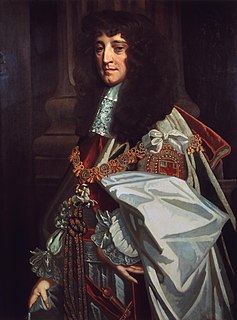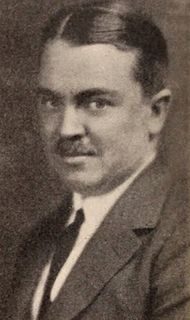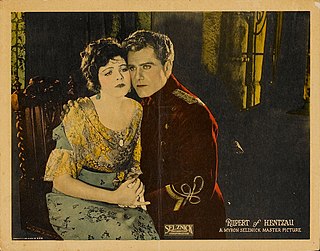
The Prisoner of Zenda is an 1894 adventure novel by Anthony Hope, in which the King of Ruritania is drugged on the eve of his coronation and thus is unable to attend the ceremony. Political forces within the realm are such that, in order for the king to retain the crown, his coronation must proceed. Fortuitously, an English gentleman on holiday in Ruritania who resembles the monarch is persuaded to act as his political decoy in an effort to save the unstable political situation of the interregnum.

Rupert or Ruppert is an English truncation of Latin Rupertus, which derives from Old High German Hruodoperht/Hruodoberht ; which is also the source of the name Robert. Thus, "Rupert" and "Robert" are different modern forms of the same name. The Old High German form of the name evolved from Germanic Hrothi, "fame, glory" + Berht, "bright"; thus, Rupert and Robert mean "fame bright".
A boy is a human male child or young man.

Rupert of Hentzau is a sequel by Anthony Hope to The Prisoner of Zenda, written in 1895 but not published in book form until 1898.

James Keteltas Hackett was an American actor and manager.
Sarah Elizabeth Lawson is an English former actress best known for her film and television roles.

The Prisoner of Zenda is a 1937 American black-and-white adventure film based on Anthony Hope's 1894 novel of the same name and the 1896 play. A lookalike has to step in when his royal distant relative is kidnapped to prevent his coronation. This version is widely considered the best of the many film adaptations of the novel and play.

The Prisoner of Zenda is a 1952 Technicolor film version of the 1894 novel of the same name by Anthony Hope and a remake of the 1937 film version and the 1922 silent version as well. This version was made by Loew's and Metro-Goldwyn-Mayer, directed by Richard Thorpe and produced by Pandro S. Berman. It stars Stewart Granger, Deborah Kerr, and James Mason. The screenplay, attributed to Noel Langley, was nearly word-for-word identical to the one used in the 1937 Ronald Colman version, which was by John L. Balderston, adapted by Wells Root, from the Hope novel and the stage play by Edward Rose, with additional dialogue by Donald Ogden Stewart.

Rupert of Hee Haw is a 1924 American silent film starring Stan Laurel and drawing on the Ruritanian romance of Rupert of Hentzau, Anthony Hope's sequel to The Prisoner of Zenda.
George Bellamy was an English film actor of the silent era. He spent eighteen years on the stage before making his film debut in Wanted - A Husband. He appeared in 70 films between 1911 and 1933. He also directed two films in 1917. He was born in Bristol, England.
Dangerous Liaisons is a 1988 American film adaptation of a Christopher Hampton play based on Les Liaisons dangereuses, a French novel by Choderlos de Laclos.

Derek Blomfield was a British actor who appeared in a number of stage, film and television productions between 1935 and his death in 1964.
Rupert of Hentzau is a 1964 British television series based on the 1898 novel Rupert of Hentzau, which ran for six half-hour episodes. It starred George Baker, Barbara Shelley, Peter Wyngarde, John Phillips, Tristram Jellinek, Sally Home and Derek Blomfield. It was recorded at the BBC Television Centre in Wood Lane, west London. All six episodes are listed as being lost.

Rupert of Hentzau is a 1915 British adventure film of the silent era. It was directed by George Loane Tucker and starred Henry Ainley, Jane Gail and Gerald Ames. It was based on the 1898 novel Rupert of Hentzau by Anthony Hope, the sequel to The Prisoner of Zenda (1894). It tells the story of the journey of an Englishmen to Ruritania in Eastern Europe where he is forced to impersonate a King to thwart the plans of a villainous aristocrat Rupert of Hentzau.

Victor Heerman was an English-American film director, screenwriter, and film producer. After writing and directing short comedies for Mack Sennett, Heerman teamed with his wife Sarah Y. Mason to win the Academy Award for Best Adapted Screenplay of Louisa May Alcott's novel Little Women in 1933. He directed the Marx Brothers' second film, Animal Crackers, in 1930. He and Mason were the first screenwriters involved in early, never-produced scripts commissioned for what would become MGM's Pride and Prejudice .
The London Film Company was a British film production company active during the silent era. Founded in 1913, the company emerged as one of the dominant forces in production during the First World War. With strong financial backing the company constructed the Twickenham Studios, then the largest in Britain, and began production of features, which were then were displacing short films as the dominant form. Two of the company's key early directors were Americans: Harold Shaw and George Loane Tucker. Later, British director Maurice Elvey made a number of films for the studio.
The Prisoner of Zenda is a 1915 British silent adventure film directed by George Loane Tucker and starring Henry Ainley, Jane Gail and Gerald Ames. Shot at Twickenham Studios, it is an adaptation of 1894 novel The Prisoner of Zenda by Anthony Hope. A film based on the 1898 sequel Rupert of Hentzau was released shortly afterwards with the same director and cast.

Rupert of Hentzau is a 1923 American silent adventure film directed by Victor Heerman and starring Bert Lytell, Elaine Hammerstein, and Lew Cody. It is an adaptation of Anthony Hope's 1898 novel Rupert of Hentzau, the sequel to The Prisoner of Zenda.










